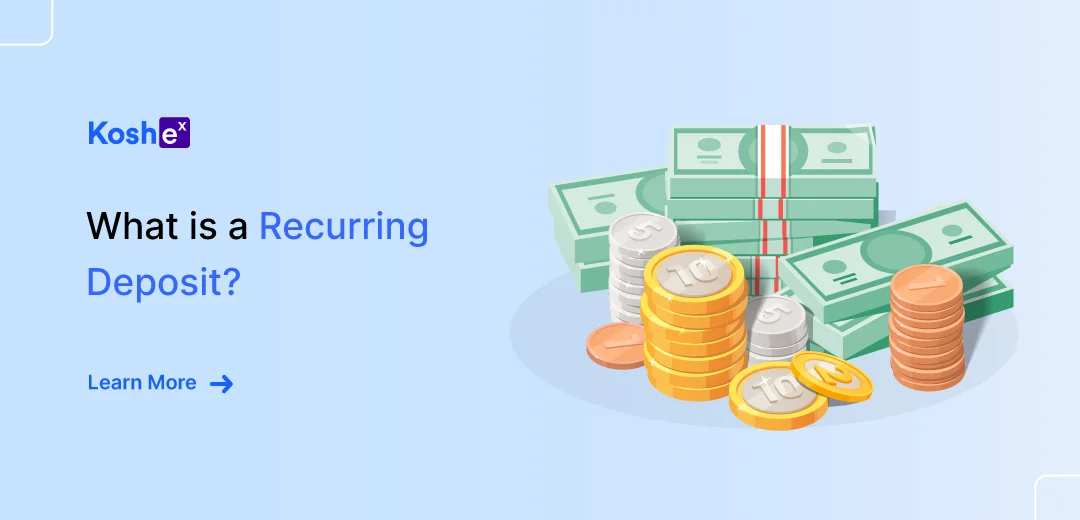Banks, NBFCs, and post offices offer different deposit schemes that offer guaranteed interest income on your deposits. A recurring deposit is one such scheme. It allows us to invest regularly and accumulate a guaranteed corpus for our financial goals. Let’s dive deep into the details of the scheme.
Introduction to a Recurring Deposit Scheme
A recurring deposit (RD) scheme is a fixed-income investment option wherein you save periodically, usually every month. Like a fixed deposit scheme, we earn a lump sum on maturity.
How do Recurring Deposit Accounts Work?
In an RD, you choose the deposit amount, the term, and the frequency of the deposit.
Once opened, we invest the chosen amount every month throughout the pre-determined tenure. Interest on our deposits is calculated periodically. We can either choose to receive the interest income periodically or a lump sum on maturity. In the case of the latter, the interest is accumulated over the deposit tenure and paid on maturity with the invested amount.
you can calculate the interest on your Investment By Recurring Deposit Calculator
Features of Recurring Deposit Accounts
Some salient features of recurring deposits are as follows:
- The minimum installment amount differs across financial institutions. However, we can start with a minimum deposit of Rs.100 per month. There’s no limit on the maximum deposit amount.
- We can choose a term ranging from 6 months to 10 years. Once the tenure is set, we cannot alter it until maturity.
- If we withdraw the deposit prematurely, a penalty will be levied. However, some banks and NBFCs may not allow premature withdrawals entirely.
- We can pledge our recurring deposit accounts as collateral to secure loans. Most lenders offer 80 to 90% of the deposit value as loans.
- A recurring deposit helps inculcate a savings habit. Hence, it is a great option for those who have just started earning.
- If the aggregate interest income from our deposits exceeds Rs.40,000 in a financial year, a TDS of 10% would be deducted from the interest. In the case of senior citizens, the TDS deduction limit is Rs.50,000.
Benefits of Opening a Recurring Deposit
Here are some reasons why investing in RDs is beneficial:
- Guaranteed interest income
Recurring deposits are fixed-income instruments. Hence, we get guaranteed interest income on our deposits. Moreover, our savings are also secured against market volatility. - Affordable Savings
RDs are affordable as they allow us to save in installments. We can start with amounts as low as Rs.100 and save affordably. Unlike a fixed deposit, where we have to deposit a lump sum, RDs offer greater flexibility. - Serves as Collateral
We can pledge our RD account to get a loan against the deposit value. This feature helps us meet our funding needs easily. - Attractive interest rates
Interest earned on recurring deposits is usually higher than on savings accounts. Like an FD, our deposit earns interest at a fixed rate determined during the account opening. - Additional benefits for senior citizens
Firstly, senior citizens earn a higher interest rate on their deposits. Secondly, the interest income is tax-free up to Rs.50,000 under Section 80TTB of the Income Tax Act, 1961.
Eligibility Criteria and Documents Required for Opening an RD
The following categories of depositors can open a recurring deposit:
- Individuals, Hindu Undivided Families (HUFs), companies, partnership firms, sole-proprietorship firms, and Government bodies can invest in the RD scheme.
- The account can be opened for minors below 10 years of age by parents or guardians
The documents required for opening the RD account are as follows:
- Account opening form – duly filled and signed.
- ID proof documents – Voter ID Card, Aadhaar card, Passport, PAN Card, etc.
- Address proof documents – Voter ID Card, Aadhaar Card, Passport, utility bills, rent agreement, property deed, etc.
- Passport-sized photographs.
- KYC documents.
How to Open an RD Account?
We can open an RD account in the following two ways:
- Offline
We have to visit a bank, NBFC, or post office branch. to open the RD account offline. An account application form will be provided, which we must fill out. Lastly, we have to submit the documents and pay the initial deposit amount. - Online
We have to visit the financial institution’s website and apply for an RD account online. Next, we fill up the online application form, upload our documents and pay the first installment online.
Many financial institutions offer mobile banking applications, allowing you to open an RD account right from your smartphone.
Interest Rate Offered on Recurring Deposit Schemes
Most recurring deposits compound the interest quarterly. The interest rates depend on the financial institution where we have opened an account and the following factors:
- Your age.
- Deposited amount.
- Chosen deposit tenure.
For ease of use, we can access online RD calculators on various portals.
Premature Withdrawals and Renewals of RDs
Premature withdrawals mean withdrawing our deposit before the chosen tenure has expired. While some financial institutions do not allow such withdrawals, others do. However, in the case where withdrawal is allowed, we must remember the following points:
- A penalty would be levied on the withdrawal.
- If we withdraw before the lock-in period, we will not earn any interest.
Renewing the recurring deposit means continuing the scheme after maturity. Most financial institutions allow depositors to renew the RD without hassles. However, here are some points worth noting when renewing our recurring deposit scheme:
- The term of the initial RD will be the default term of the renewed RD.
- The RD deposit amount will also remain the same.
- The interest rate on the deposit might change if the financial institution has changed its deposit rates at the time of renewal.
Things to Check When We Open an RD
- We must choose an investment amount that we can comfortably deposit every month.
- We must choose a deposit tenure based on our investment horizon.
- We must compare the interest rates offered by different financial institutions. Investing in an RD with the highest interest rates will help us maximize our return potential.
- We must check the premature withdrawal rules and any applicable penalties.
Conclusion
Recurring deposits can help us save steadily, build up a disciplined saving habit and earn guaranteed returns. So, recurring deposits are ideal if we want to invest in installments and earn assured returns. Moreover, comparing the interest rates across financial institutions will help us choose the scheme with the highest rate.
For best results, we must choose a term that matches our financial needs, before investing. Further, opening an account online allows us to avoid extra paperwork and sign up for an RD without hassle. Depositors can also try and place an ECS facility on the bank account to ensure timely deposit of installments on the due date, without fail, thus avoiding penalties.
So, sign up with Koshex and start your RD investment journey with ease and convenience.
FAQs
- Do recurring deposits allow any tax benefits?
Tax benefits are only available to senior citizens on interests up to Rs.50,000 under Section 80TTB. - What will happen to the recurring deposit if the market falls?
The recurring deposit will not be affected even if the market falls. The returns on the deposit are not market-linked. Depositors will get guaranteed interest on your deposit throughout the tenure. - Can NRIs open a recurring deposit account?
Yes, NRIs can also open a recurring deposit account.






Leave a Comment